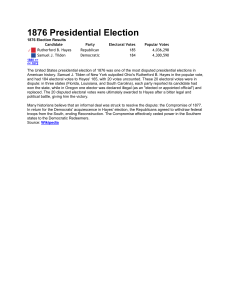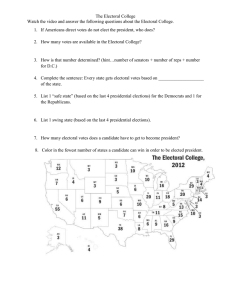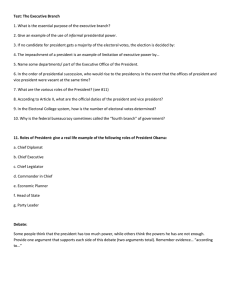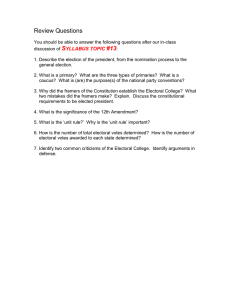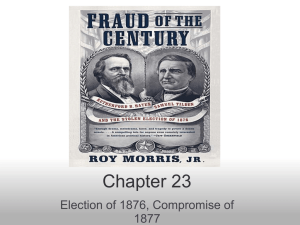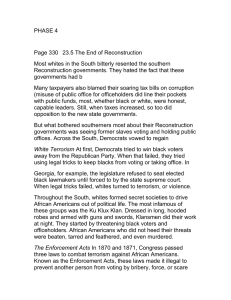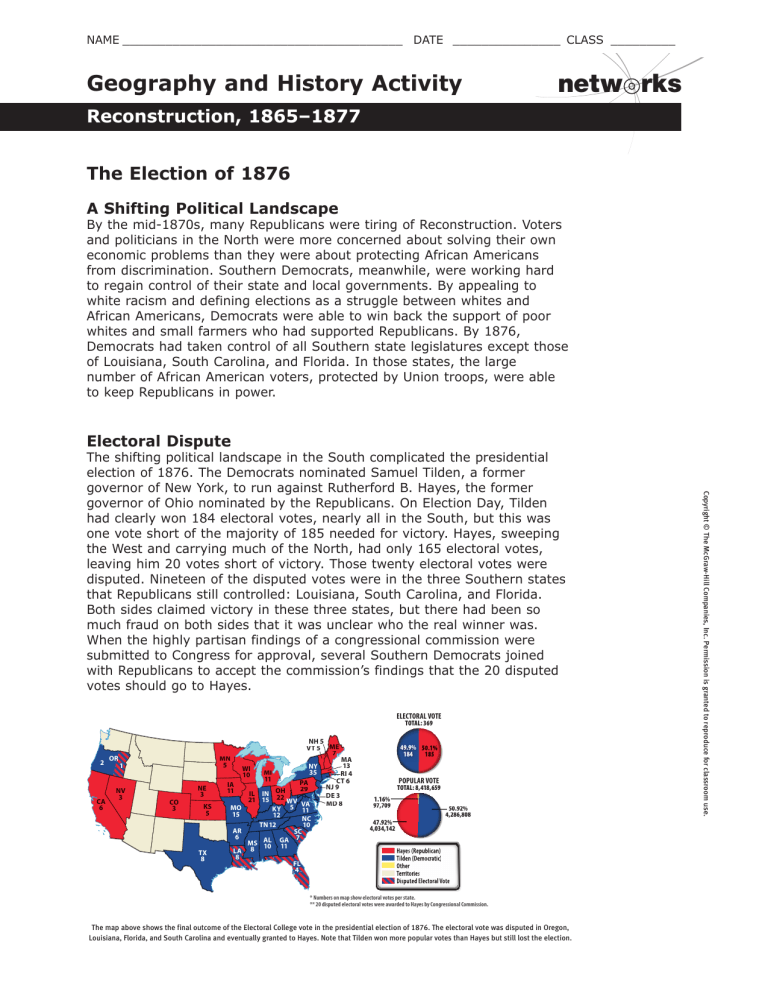
Name _______________________________________ Date _______________ CLaSS _________ Geography and History Activity netw rks Reconstruction, 1865–1877 The Election of 1876 A Shifting Political Landscape By the mid-1870s, many Republicans were tiring of Reconstruction. Voters and politicians in the North were more concerned about solving their own economic problems than they were about protecting african americans from discrimination. Southern Democrats, meanwhile, were working hard to regain control of their state and local governments. By appealing to white racism and defining elections as a struggle between whites and african americans, Democrats were able to win back the support of poor whites and small farmers who had supported Republicans. By 1876, Democrats had taken control of all Southern state legislatures except those of Louisiana, South Carolina, and Florida. In those states, the large number of african american voters, protected by Union troops, were able to keep Republicans in power. Electoral Dispute ELECTORAL VOTE TOTAL: 369 2 CA 6 OR 1 NV 3 NH 5 VT 5 ME 7 MN 5 CO 3 NE 3 KS 5 TX 8 WI 10 IA 11 MI 11 NY 35 PA 29 IL IN OH 21 15 22 WV VA MO KY 5 11 15 12 NC 10 TN 12 AR SC 6 GA 7 MS AL 10 11 LA 8 8 FL 4 MA 13 RI 4 CT 6 NJ 9 DE 3 MD 8 49.9% 50.1% 184 185 POPULAR VOTE TOTAL: 8,418,659 1.16% 97,709 47.92% 4,034,142 50.92% 4,286,808 Hayes (Republican) Tilden (Democratic) Other Territories Disputed Electoral Vote * Numbers on map show electoral votes per state. ** 20 disputed electoral votes were awarded to Hayes by Congressional Commission. The map above shows the final outcome of the Electoral College vote in the presidential election of 1876. The electoral vote was disputed in Oregon, Louisiana, Florida, and South Carolina and eventually granted to Hayes. Note that Tilden won more popular votes than Hayes but still lost the election. Copyright © The McGraw-Hill Companies, Inc. Permission is granted to reproduce for classroom use. the shifting political landscape in the South complicated the presidential election of 1876. the Democrats nominated Samuel tilden, a former governor of New York, to run against Rutherford B. Hayes, the former governor of Ohio nominated by the Republicans. On election Day, tilden had clearly won 184 electoral votes, nearly all in the South, but this was one vote short of the majority of 185 needed for victory. Hayes, sweeping the West and carrying much of the North, had only 165 electoral votes, leaving him 20 votes short of victory. those twenty electoral votes were disputed. Nineteen of the disputed votes were in the three Southern states that Republicans still controlled: Louisiana, South Carolina, and Florida. Both sides claimed victory in these three states, but there had been so much fraud on both sides that it was unclear who the real winner was. When the highly partisan findings of a congressional commission were submitted to Congress for approval, several Southern Democrats joined with Republicans to accept the commission’s findings that the 20 disputed votes should go to Hayes. Name________________________________________ Date ________________ CLASS __________ Geography and History Activity Cont. netw rks Reconstruction, 1865–1877 Directions: Answer the questions below in the space provided. Understanding Concepts 1. Why do you think the only Southern states that Hayes won were Louisiana, Florida, and South Carolina? _____________________________________________ 2. Why do you think Tilden was able to beat Hayes in some Northern states? ______________________________________________ 3. Why do you think some Southern Democrats approved of the decision to grant Hayes all of the disputed electoral votes? ________________________________________________________ ________________________________________________________ 4. How is it possible that Tilden won more popular votes but still lost the electoral vote? ________________________________________________________ ________________________________________________________ 5. How might the political situation in the South have been different if Tilden had won any one of the disputed states? ________________________________________________________ ________________________________________________________ Copyright © The McGraw-Hill Companies, Inc. Permission is granted to reproduce for classroom use. Applying the Concept

